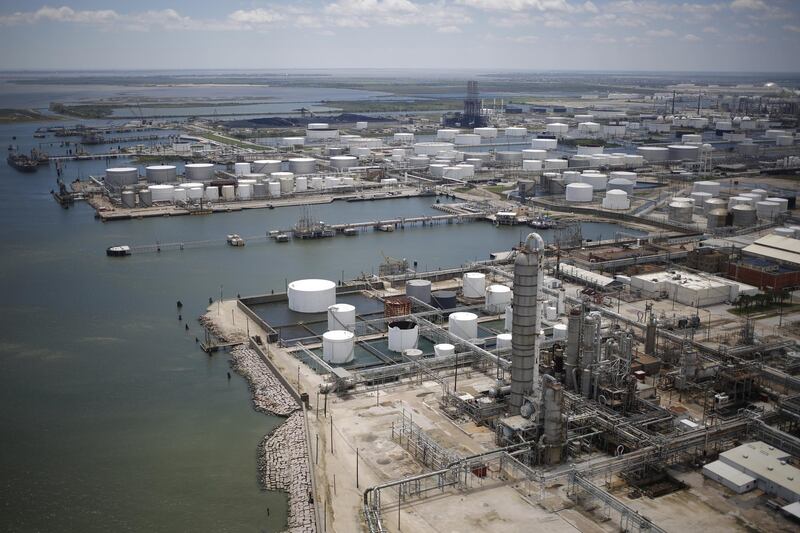Middle East producers have been quick to take advantage of the fact that Asian buyers of liquefied petroleum gas are already paying for disruptions half a world away in Texas as record rainfall halted shipments of propane and butane from ports that handle more than 90 per cent of US exports to the region.
Saudi Aramco and Kuwait Petroleum announced this week that they would increase September contract prices for propane and butane by US$40 to $60 a tonne amid bullish sentiment, traders said. The region’s countries are the most likely alternative suppliers because they are nearest to Asia, said Ong Han Wee, a consultant with FGE in Singapore.
“Affected buyers will seek cargoes from elsewhere,” said Mr Ong. “The prices jumped last Friday in Asia, just before or when the hurricane made landfall. The Middle East contract prices are also higher now, most likely because of sentiment from Harvey.”
US marine export terminals operated by Enterprise Products Partners, Targa Resources and Phillips 66, all suppliers of the fuel, are shut because of closures at the Houston Ship Channel, Port of Beaumont and Port of Freeport, according to the companies. Mont Belvieu, Texas, facilities belonging to Enterprise and Targa have also halted some fractionation operations, in which raw liquids are turned into products like propane and butane. There are no estimates yet for when the ports will reopen.
_______________
Read more:
'Catastrophic' storm Harvey batters Texas leaving 2,000 stranded
_______________
The US Gulf Coast, home to the largest LPG storage caverns in the world, is a key global supplier, so events there can ricochet in markets around the world. As Hurricane Harvey made landfall near Corpus Christi, Texas, late last week, propane prices in North-east Asia climbed. And as it approached the Louisiana coast before making a second strike Wednesday as a tropical storm, Asian buyers, which import the fuel for heating and petrochemical production, are caught in the middle.
North-east Asia propane swaps for September traded at a premium of $8.50 a tonne to October prices Thursday, flipping from a discount of $1 a tonne on August 22, data from the broker Ginga showed. The unexpected drop in supplies is creating a backwardated market in which it is relatively more expensive to get prompt cargoes than later deliveries.
_______________
Read more:
Shell, Exxon say some pollution released as storm hits Texas
_______________
While international LPG prices have soared since Harvey’s landfall, propane traded at the Mont Belvieu Enterprise terminal has not kept pace, rising just 2 per cent since August 24, according to DTN Energy data. The lack of dramatic price action stateside will expand arbitrage opportunities to Asia once the exporters can finally use the Gulf Coast ports, said Peter Fasullo, the co-founder of the LPG consultancy En*Vantage.
The US is expected to export 28 million tonnes of propane and butane this year, half of which will go to Asian buyers in Japan, South Korea and China, according to FGE.
But the US has not sent a single LPG tanker from the Gulf Coast since August 25, according to the Bloomberg market specialist Bert Gilbert. The Ports of Houston and Freeport have said they are still uncertain when they’ll be able to reopen to vessel traffic.
And supply concerns extend beyond the shutdown of the ports.
Cedar Bayou, a body of water just outside of the fractionation and storage hub in Mont Belvieu, recorded 132 centimetres of rain this week, setting a new record for the continental US, according to the National Weather Service.
_______________
Read more:
How will Hurricane Harvey affect US energy sector?
_______________
That much water could signal weeks of trouble for the storage facilities there, Mr Fasullo said. Underground storage of LPG uses brine ponds to pump highly salinated fluids into caverns. If heavy rains dilute the salty ponds, contamination and containment issues that make it hard to get the fuel out of storage may occur.
Enterprise’s “storage assets have remained operational,” said Rick Rainey, a company spokesman in Houston. “We continue to manage our brine supplies.”
But Targa’s capacity to receive raw products was “negatively impacted” by flooding, according the company.
“I don’t think there’s going to be any relief for many days, and if those many days turn into weeks, it could be a one- to three-week period” before normal exports resume, Mr Fasullo said. “Propane prices could go off to the races because I think you’re going to get strong storage draws when we will be able to get those export terminals up.”
_______________
Read more:
US petrol prices surge as Harvey shuts refineries
_______________
Domestically, US drivers are also feeling the pain.
The AAA said early Wednesday - the latest data available - that retail prices were up 6 cents from a week ago at $2.404 per gallon of regular petrol nationwide. They have risen as much as 12 cents in some states, like Georgia.
Attracted by a surge in profits, refiners in Asia have also been trying to fix fuel cargoes to the US, despite the huge distance across the Pacific.
Gasoline refinery profits in Singapore, a benchmark in Asia, jumped to over $15.50 per barrel since the storm hit late last week, their highest level since early 2016.
The US disruptions have hit wholesalers. The premium for Chicago-area petrol above benchmark futures is at its highest since June 2016, while the Gulf Coast price is at its widest above futures since August 2012.
Suppliers in Chicago were trying to secure supplies after the Explorer Pipeline, which typically carries about 350,000 barrels a day (bpd) to the region, shut down
in Chicago were trying to secure supplies after the Explorer Pipeline, which typically carries about 350,000 barrels a day (bpd) to the region, shut down.






